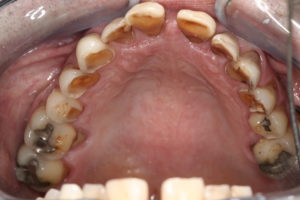
Gastroesophageal reflux disease also known as GERD occurs when stomach acid frequently flows back into the esophagus. This reflux can irritate the lining of your esophagus. It can also erode the enamel of your teeth. The most common symptom of GERD is heartburn, in certain people the first sign they are experiencing the disease can be dental erosion. Dental erosion is also common in people who have high intake of acidic foods, repeated vomiting from GI problems or eating disorders. Some factors that can aggrarvate acid reflux include smoking, eating large meals at night, drinking certain beverages like alcohol or coffee and taking certain medications like aspirin.
Dental erosion starts at the enamel, which is the hard protective coating over our teeth. Enamel is one of the hardest substances in the human body but in an overly acidic environment it begins to soften and demineralize. This slow wearing down of the enamel leaves the more sensitive parts of the tooth exposed. Our saliva helps to put minerals back into the enamel after we eat acidic foods, but if there is a consistently higher acidity the saliva can’t work as it should.
If unusual signs of dental erosion are found on dental exam you may need to see a gastroenterologist. Dietary and lifestyle modifications are not enough to bring chronic GERD under control. Fortunately there are medications that will help. Once the enamel is eroded it is gone forever and will require restorative dental therapy to fix the teeth involved.